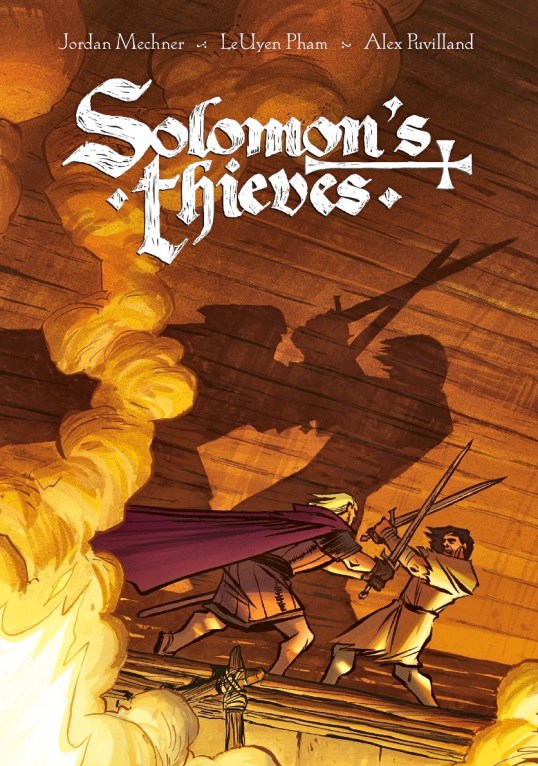 In your new graphic novel Solomon’s Thieves, you give the audience yet another reluctant hero in Martin. What do you think is compelling about protagonists who don’t know what to do with themselves?
In your new graphic novel Solomon’s Thieves, you give the audience yet another reluctant hero in Martin. What do you think is compelling about protagonists who don’t know what to do with themselves?
That’s reality, isn’t it? It doesn’t often happen in life that a benevolent authority tells you what you’re supposed to do with yourself, lays down the rules, you follow them and it all turns out great. At least I don’t know anyone whose life has been like that.
There’s opportunistic political maneuvering by the ruling classes in Solomon’s Thieves and the use of torture to pervert the judicial process. Were you intending for these elements to be commentary on the present-day or just reflect the time period the book happens in?
I was fascinated by the history of the Templar trial and it was important to me to tell that story truthfully and accurately. That said, I think part of the reason that history attracted me was because it resonates so deeply with our own time, and some of the things we’ve experienced in the twentieth century, that my parents grew up with and that we’re still experiencing today. Some things never change.
You’ve created extensively across three different mediums now. You made a documentary film and worked on screenplays for movies, as well as writing graphic novels and programming/directing games. What are the specific strengths of each medium or endeavor, in your mind?
Wow, there’s a lot to be said on that subject. A video game story is a story that’s written to be played, so the focus is on creating action that’s challenging and fun for the player. Movies are good at action too, and scope and spectacle, but the suspense and emotional impact comes out of our feeling of empathy with the characters and their plight. Whereas graphic novels engage the reader’s intellect and imagination in a more active way, they’re about the interplay between words and images, and the action doesn’t unfold in real time the way it does in a game or movie.
You’re also working on the screenplay for Michael Turner’s Fathom. Did you get to meet Turner before his unfortunate and untimely passing? Do you think there is a way to memorialize him in the film-making?
I wish I’d had the chance to meet Mike. I only know him through the stories I’ve heard from people who did know him. He was obviously an amazing human being and I know making a Fathom movie was a dream of his.
Aquatic action films have been hit or miss in Hollywood. What approach are you taking in adapting Fathom?
My approach was simply to try to make it as real and believable as possible, to ask questions and build it from the bottom up. If this race of underwater beings really existed, what would they be like? Given what we know about the oceans, physics, and evolutionary biology, how might their history and culture have developed over the past seventy thousand years, what kinds of things would they have and not have? And to try to put myself in this girl’s shoes, her emotional journey; what would it feel like to grow up being her? If I’m going to have any chance of making an audience believe this could happen, I need to believe it first myself.
What comics and games are you loving right now?
LEGO Indiana Jones. It’s the most brilliant movie tie-in videogame ever, I think. In comics, I’m enjoying the Dungeon series by Sfar and Trondheim.
You tend to focus on period pieces. Even your documentary Chavez Ravine focused on a Mexican-American community that disappeared in post-war Los Angeles. Do you enjoy looking back through history?
That’s one of the great perks of what I do — it gives me an excuse to spend time learning about other periods, cultures and places, and then have the fun of trying to bring that time and place to life in a new way. I love it.

